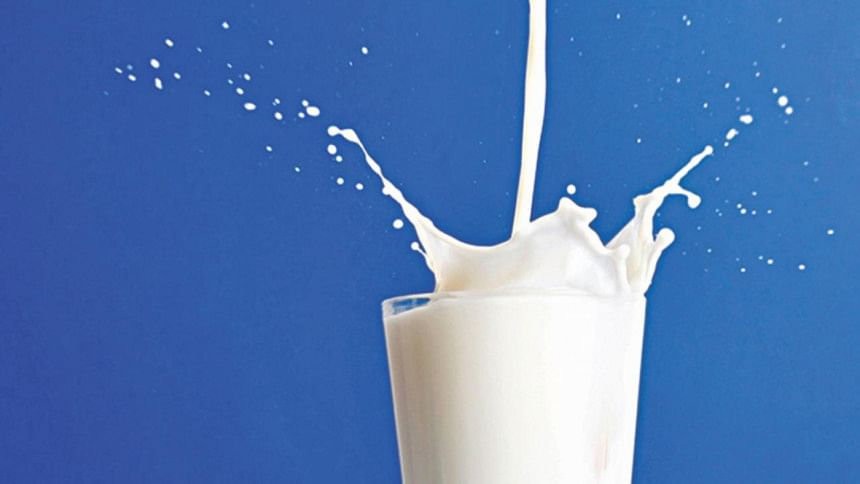Detergent, anti-biotics in milk

Dhaka University researchers have found detergent and antibiotics for humans in packaged milk available in kitchen markets and grocery shops, raising serious health concerns.
The antibiotics include levofloxacin, ciprofloxacin and azithromycin that are used mainly to treat bacterial infections in humans.
The DU Pharmacy Faculty and Biomedical Research Centre came to the conclusion after testing seven samples of widely-sold pasteurised milk and three samples of unpasteurised milk.
The study also found that nine other food items manufactured and marketed by some of the top brands in the country do not meet the BSTI standards. These items -- ghee, fruit drinks, turmeric powder, dry chilli powder, palm oil, mustard oil and soybean oil -- also contain ingredients harmful to human health.
The sample turmeric powders and fruit drinks, for example, contain substances that can cause cancer.
The Daily Star is not naming the companies because their comments were not immediately available, but all these brands are household names and they boast of their “superior quality” in advertisements.
The study began in May last year and the samples were collected from Shahbagh, Chankharpool and Palashi in the capital.
Prof ABM Faroque, director of Biomedical Research Centre, unveiled the findings at a press conference at the DU yesterday.
“Antibiotics for humans and animals are completely different. We need to stop using human antibiotics on animals,” he said.
He warned of fatal consequences if this continued.
“We will not survive; we will die soon if the antibiotics are used randomly. To save human lives, please stop using antibiotics on animals that are meant for humans,” he said.
Earlier in February, BSTI’s own survey found lead and pesticides in milk marketed by top brands. It also found that the majority of raw and packaged milk do not meet the quality control authority’s safety standards.
Consumption of detergents, lead and pesticides can damage lungs, kidneys and liver.
Interestingly, however, the Bangladesh Standard Testing Institute (BSTI) yesterday submitted a report to the High Court saying its test did not detect any hazardous substance in pasteurised milk of 14 brands, including some top ones.
The BSTI conducted the test in line with an HC order on May 21 last year. The court will hear the matter on a later date, said BSTI lawyer Sarkar MR Hasan, who submitted the report.
However, it was not clear what parameters were used in the BSTI test.
TO EAT OR NOT TO EAT?
Researchers tested eight samples of ghee, sold in tin cans, and all of them were found adulterated and way below the BSTI standards.
According to the standard set by the BSTI, ghee can contain highest 0.5 percent moisture content. The study found it to be 0.75 to 1.17 percent in the samples.
Also, all the samples contain 35.12-50.03 percent iodine when the permissible limit is 26 to 35 percent. The test also found sesame oil in the samples, which is completely prohibited.
All the 11 samples of fruit drinks contain artificial sweetener sodium cyclamate, which is prohibited because of its health risk, including cancer. It is currently banned in the US.
“Artificial sweeteners like cyclamate is carcinogenic, meaning it has the potential to cause kidney and liver stones and even cancer. It may also cause problems in the cardiovascular system, decrease in mental health and gastrointestinal disorders or adverse reactions,” said Prof Faroque.
Chilli powder can have highest 1.25 percent acid insoluble ash, according to the BSTI. But the eight samples tested by the DU researchers contain 1.31 to 1.49 percent. Also, two samples have moisture content beyond permissible limit.
The DU researcher also found textile colour in all the six samples of turmeric powder, while their moisture content is much higher than the BSTI limit.
The textile dyes found in turmeric powder is basically carcinogen, a substance that can cause cancer, Prof Faroque told The Daily Star.
“Textile dyes can cause asthma or lung inflammation in children. You will see many children suffering from asthma these days, but they are now not supposed to suffer from that disease at this early age,” he said.
As for palm oil, the national limit for saponification value is 190-209, but the 10 samples tested had 220.05 to 286. The samples also failed to pass the BSTI standards in three other parameters. They have higher per-oxide value, insoluble impurities and moisture content.
All the eight mustard oil samples have twice or thrice the moisture content allowed by the BSTI (0.25 percent). Also, three samples have higher saponification value, four have higher per-oxide and four have higher relative density.
Test results show all the eight samples of soybean oil contain more metal content than permitted. All the samples have copper between 0.13 to 0.53 ppm (parts per million) while six have 1.5 ppm iron. The maximum permissible limit of both the metals is 0.1 percent.

 For all latest news, follow The Daily Star's Google News channel.
For all latest news, follow The Daily Star's Google News channel. 





Comments